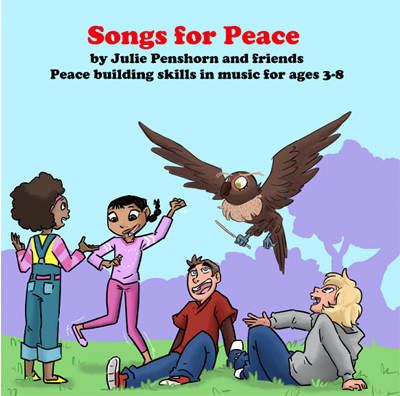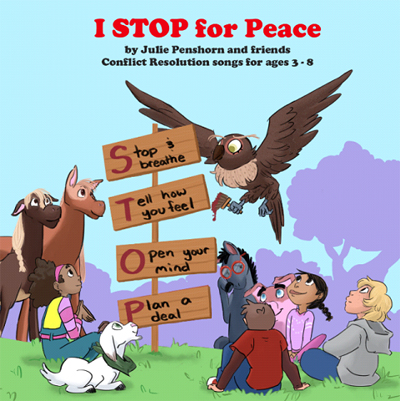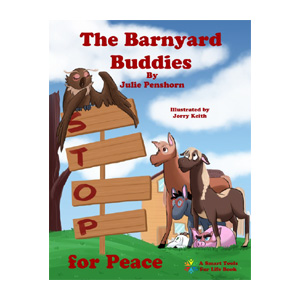Without skills for peaceful conflict resolution and problem solving, children are often labeled “bad,” “acting out,” and “disruptive.” But what are they to do when they have strong emotions and no social skills for working out their problems? And what are adults to do to cope with violent behavior at home or at school/preschool?

Boys in conflict over toys can cause injury.
Conflict over limited resources can be an opportunity!
Is this a picture of life at your house or in your classroom? There will always be limited resources in our worlds, whether it’s a classroom or a nation. It’s simply not possible to provide everything every child wants all the time. And, this gives us opportunities for learning as we guide children. But children need tools and skills for managing their anger and staying in community when faced with limited resources and other situations that prompt their frustration, anger, or other emotions. Without these tools they may feel compelled to lash out and potentially hurt themselves and/or others.
As we watch how people are sharing resources as they recover from hurricanes Harvey and Irma, we can be inspired to believe that people can make smart decisions that are good for all, their relationships with each other, and the planet.
Skills for peaceful conflict resolution provide key social and emotional skills!
Over the years, recognition of the importance of social emotional learning (SEL) has swelled. Now, we have governors of several states talking about their goals for educating preschoolers in SEL, based on research showing its importance for adult lives. Hanna Melnick, Channa M. Cook-Harvey, and Linda Darling-Hammond recently wrote in “Encouraging Social and Emotional Learning in the Context of New Accountability” (2017 — provides numerous links and references for further reading):
The Every Student Succeeds Act (ESSA) . . . provides an important opportunity for states to broaden the definition of student success to include measures of students’ social-emotional, as well as academic, development. Social and emotional learning (SEL) is a broad and multifaceted concept, which the Collaborative for Academic, Social, and Emotional Learning (CASEL) defines as “the process through which children and adults acquire and effectively apply the knowledge, attitudes, and skills necessary to understand and manage emotions, set and achieve positive goals, feel and show empathy for others, establish and maintain positive relationships, and make responsible decisions.” Well-implemented programs designed to foster SEL are associated with positive outcomes, ranging from better test scores and higher graduation rates to improved social behavior.
Of course, children will continue to be significantly impacted throughout their lives by many challenges! But the tools we provide in our children’s books and children’s music are useful for navigating the world safely, with self confidence and joy. We call our tools, “Smart Tools for Life” because it is smart to learn them! Further, they are memorable and engaging, and sink deeply into children’s hearts and minds — often for life.
“I STOP for Peace” music and “The Barnyard Buddies Stop for Peace”
Our first children’s book is called, “The Barnyard Buddies STOP for Peace.” In it, the characters experience a conflict over resources, and work it out peacefully. They don’t stop there, however, they regain their trust in each other, renew their relationships, and celebrate their success.

Share social and other peacemaking skills with children and build a culture of peace!
The book is enhanced by two music CDs: “Songs for Peace,” by Julie Penshorn with Rebecca Janke, and one that specifically supports the learning in the book: “I STOP for Peace,” also by Penshorn with Janke. The children on the music CD refer to the book and connect the dots for you! You can purchase all at www.Amazon.com. Here’s the link for I Stop for Peace music on Amazon, or get it at Smart Tools for Life.

Children’s music, conflict resolution songs for ages 3 to 9. I STOP for Peace, by Julie Penshorn
Tools in your “smart” toolbox!
When you have a tool like The Barnyard Buddies STOP for Peace, in your parenting and teacher toolbox, you can connect it to any ongoing program you have, or it can be a freestanding program. It’s especially appropriate to the needs of young children ages 3 to 9.
Children develop relationships with the characters that can be used to enhance their learning in a variety of ways. For example, when children are in conflict you can ask: “Now how would Mrs. McCloud (the owl, and the key peacemaker in the story) solve that?” The end result in the story is better relationships, more community, and no blame, shame, or harsh punishments. Why shouldn’t all our conflicts end that way?
A Story
A friend brought a four-year-old to the book reading (partially shown on the video above). After the book reading, she, her boyfriend, and the child went to the zoo. It was a rainy day like in the book. My friend told me later that when they walked by the zebras the child said, “Look at that zebra! He’s just like King! He’s not sharing the space under the leanto!” Already, she was connecting the characters in the book to her daily life and to others in it.
Teacher and parent guide in the book
An added benefit of the book, “The Barnyard Buddies STOP for Peace,” is that it contains a teacher and parent guide, plus the music for the “I STOP for Peace” song. You don’t have to struggle to integrate this book with your curriculum. It effortlessly flows into it. In fact, it can BE your conflict resolution curriculum! With the music to enhance memorability, children will soon be conflict resolution experts!
There are as many ways to be peacemakers as there are people. The joy of finding a resolution to conflict that enhances our lives rather than detracts from it, is sublime! So, we learn the skills, we practice, and it becomes easier and more natural every time.

